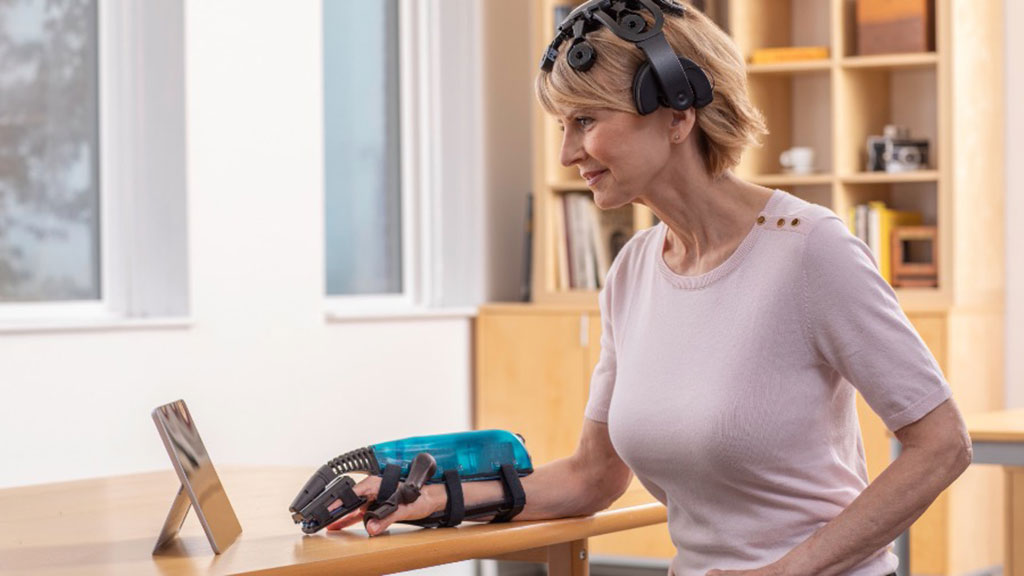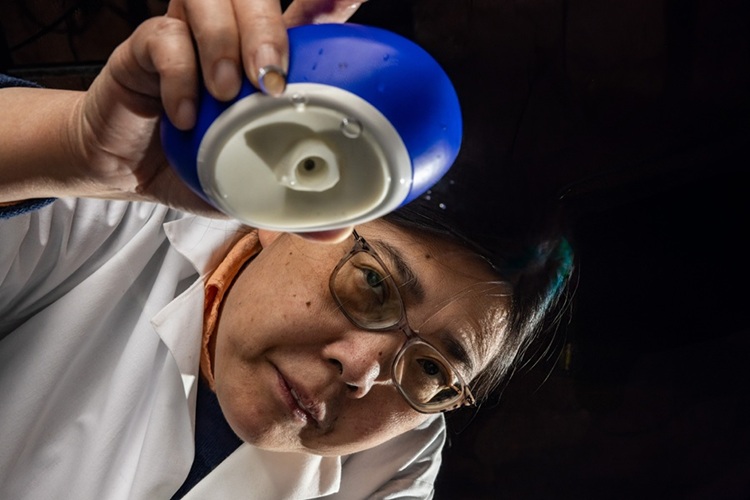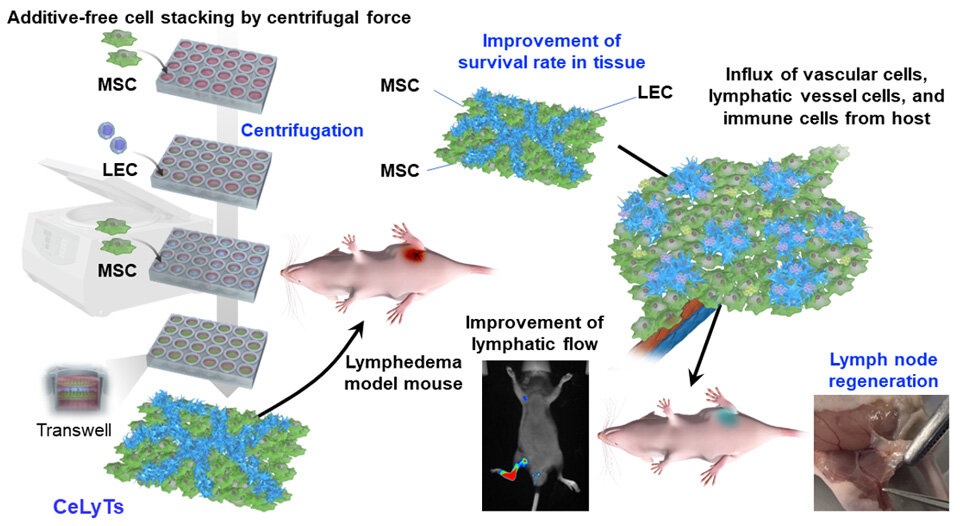Stroke Recovery Device Facilitates Muscle Reeducation
|
By HospiMedica International staff writers Posted on 06 May 2021 |

Image: The IpsiHand system uses the brain to rehabilitate arm movement (Photo courtesy of Neurolutions)
A brain-computer-interface (BCI) system assists functional rehabilitation in stroke patients with upper extremity disability.
The Neurolutions (Santa Cruz, CA, USA) IpsiHand system is designed to leverage the uninjured (ipsilateral) side of the brain to improve arm and hand function by harnessing BCI. The system includes a lightweight, adjustable, battery-powered, robotic exoskeleton that physically opens and closes the patient's hand in response to the patient's thoughts; a wireless electroencephalography (EEG) biometric headset that measure the patient's brain signals; and a tablet application that guides the patient through the therapy session and provides for seamless upload of usage and performance data to the cloud.
IpsiHand uses non-invasive EEG electrodes--instead of an implanted electrode or other invasive feature--to record brain activity. EEG data is then wirelessly conveyed to the tablet for to determine the patient's intent to move their affected hand, and analysis of the intended movement. These signals are translated into motor movement signals of the robotic skeleton hand brace, resulting in opening and closing of the impaired hand, wrist, and arm, helping stroke patients improve grasping. The device should not be used by patients with severe spasticity or rigid contractures that can prevent the electronic hand brace from being properly fit or positioned.
“A person whose left hand and arm are paralyzed has sustained damage to the motor areas on the right side of the brain. But the left side of the person’s brain is frequently intact,” said neurosurgeon Eric Leuthardt, MD, founder and chief scientific officer of Neurolutions. “The idea is that if you can couple those motor signals that are associated with moving the same-sided limb with the actual movements of the hand, new connections will be made in your brain that allow the uninjured areas of your brain to take over control of the paralyzed hand.”
Although stroke occurs in the brain, it affects the entire body and can cause long-term disability, such as complete paralysis of one side of the body (hemiplegia) or one-sided weakness (hemiparesis). Stroke survivors may have problems with the simplest of daily activities, including speaking, walking, dressing, eating, and using the bathroom. Intensive, repeated, and long-term rehabilitation training are critical for enhancing the physical mobility of stroke patients, helping to alleviate post-stroke symptoms.
Related Links:
Neurolutions
The Neurolutions (Santa Cruz, CA, USA) IpsiHand system is designed to leverage the uninjured (ipsilateral) side of the brain to improve arm and hand function by harnessing BCI. The system includes a lightweight, adjustable, battery-powered, robotic exoskeleton that physically opens and closes the patient's hand in response to the patient's thoughts; a wireless electroencephalography (EEG) biometric headset that measure the patient's brain signals; and a tablet application that guides the patient through the therapy session and provides for seamless upload of usage and performance data to the cloud.
IpsiHand uses non-invasive EEG electrodes--instead of an implanted electrode or other invasive feature--to record brain activity. EEG data is then wirelessly conveyed to the tablet for to determine the patient's intent to move their affected hand, and analysis of the intended movement. These signals are translated into motor movement signals of the robotic skeleton hand brace, resulting in opening and closing of the impaired hand, wrist, and arm, helping stroke patients improve grasping. The device should not be used by patients with severe spasticity or rigid contractures that can prevent the electronic hand brace from being properly fit or positioned.
“A person whose left hand and arm are paralyzed has sustained damage to the motor areas on the right side of the brain. But the left side of the person’s brain is frequently intact,” said neurosurgeon Eric Leuthardt, MD, founder and chief scientific officer of Neurolutions. “The idea is that if you can couple those motor signals that are associated with moving the same-sided limb with the actual movements of the hand, new connections will be made in your brain that allow the uninjured areas of your brain to take over control of the paralyzed hand.”
Although stroke occurs in the brain, it affects the entire body and can cause long-term disability, such as complete paralysis of one side of the body (hemiplegia) or one-sided weakness (hemiparesis). Stroke survivors may have problems with the simplest of daily activities, including speaking, walking, dressing, eating, and using the bathroom. Intensive, repeated, and long-term rehabilitation training are critical for enhancing the physical mobility of stroke patients, helping to alleviate post-stroke symptoms.
Related Links:
Neurolutions
Latest Patient Care News
- Revolutionary Automatic IV-Line Flushing Device to Enhance Infusion Care
- VR Training Tool Combats Contamination of Portable Medical Equipment
- Portable Biosensor Platform to Reduce Hospital-Acquired Infections
- First-Of-Its-Kind Portable Germicidal Light Technology Disinfects High-Touch Clinical Surfaces in Seconds
- Surgical Capacity Optimization Solution Helps Hospitals Boost OR Utilization

- Game-Changing Innovation in Surgical Instrument Sterilization Significantly Improves OR Throughput
- Next Gen ICU Bed to Help Address Complex Critical Care Needs
- Groundbreaking AI-Powered UV-C Disinfection Technology Redefines Infection Control Landscape
- Clean Hospitals Can Reduce Antibiotic Resistance, Save Lives
- Smart Hospital Beds Improve Accuracy of Medical Diagnosis
- New Fast Endoscope Drying System Improves Productivity and Traceability
- World’s First Automated Endoscope Cleaner Fights Antimicrobial Resistance
- Portable High-Capacity Digital Stretcher Scales Provide Precision Weighing for Patients in ER
- Portable Clinical Scale with Remote Indicator Allows for Flexible Patient Weighing Use
- Innovative and Highly Customizable Medical Carts Offer Unlimited Configuration Possibilities
- Biomolecular Wound Healing Film Adheres to Sensitive Tissue and Releases Active Ingredients
Channels
Artificial Intelligence
view channelCritical Care
view channel
Bioadhesive Patch Eliminates Cancer Cells That Remain After Brain Tumor Surgery
Glioblastoma is the most common and aggressive form of brain tumor, characterized by rapid growth, high invasiveness, and an extremely poor prognosis. Even with surgery followed by radiotherapy and chemotherapy,... Read more
Wearable Patch Provides Up-To-The-Minute Readouts of Medication Levels in Body
Vancomycin is a powerful antibiotic used in hospitals to treat severe drug-resistant infections and life-threatening bloodstream infections. However, dosing the drug is notoriously difficult, as too little... Read moreSurgical Techniques
view channel
Surgical Innovation Cuts Ovarian Cancer Risk by 80%
Ovarian cancer remains the deadliest gynecological cancer, largely because there is no reliable screening test, and most cases are diagnosed at advanced stages. Thousands of patients die each year as treatment... Read more
New Imaging Combo Offers Hope for High-Risk Heart Patients
Patients with type 2 diabetes often develop complex, severe coronary artery disease involving multiple narrowed or blocked arteries, making complete revascularization difficult. Without detailed functional... Read moreHealth IT
view channel
EMR-Based Tool Predicts Graft Failure After Kidney Transplant
Kidney transplantation offers patients with end-stage kidney disease longer survival and better quality of life than dialysis, yet graft failure remains a major challenge. Although a successful transplant... Read more
Printable Molecule-Selective Nanoparticles Enable Mass Production of Wearable Biosensors
The future of medicine is likely to focus on the personalization of healthcare—understanding exactly what an individual requires and delivering the appropriate combination of nutrients, metabolites, and... Read moreBusiness
view channel
Medtronic to Acquire Coronary Artery Medtech Company CathWorks
Medtronic plc (Galway, Ireland) has announced that it will exercise its option to acquire CathWorks (Kfar Saba, Israel), a privately held medical device company, which aims to transform how coronary artery... Read more
Medtronic and Mindray Expand Strategic Partnership to Ambulatory Surgery Centers in the U.S.
Mindray North America and Medtronic have expanded their strategic partnership to bring integrated patient monitoring solutions to ambulatory surgery centers across the United States. The collaboration... Read more
FDA Clearance Expands Robotic Options for Minimally Invasive Heart Surgery
Cardiovascular disease remains the world’s leading cause of death, with nearly 18 million fatalities each year, and more than two million patients undergo open-heart surgery annually, most involving sternotomy.... Read more


















